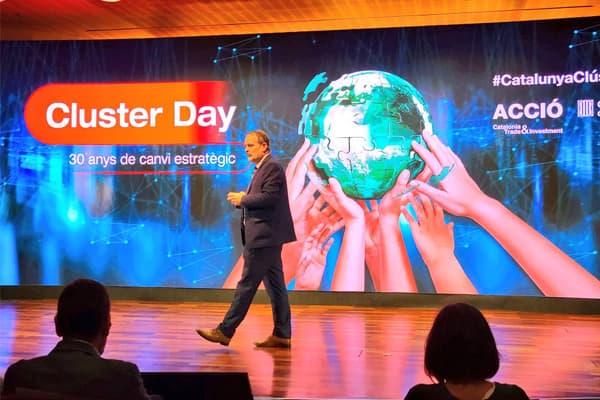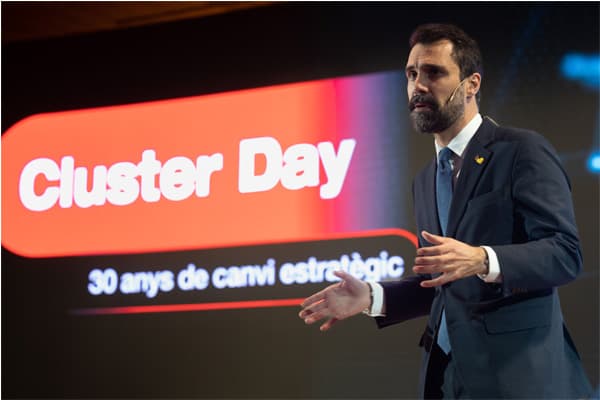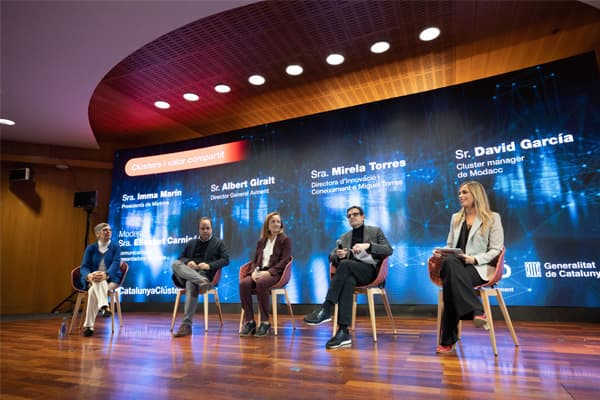
Harvard University will study the Catalan cluster policy as a global success case
Catalan Economy
16 Dec 2022
The Minister of Business and Labour, Roger Torrent, participated at Cluster Day, an event organized by ACCIÓ-Catalonia Trade & Investment to commemorate 30 years of cluster policy in Catalonia.
Harvard University will study the Catalan cluster policy as a global success case. The announcement was made at Cluster Day, an event organized to commemorate 30 years of cluster policy in Catalonia.
The Minister of Business and Labour, Roger Torrent, emphasized that "30 years ago, in Catalonia we were pioneers in cluster policy on a global scale, as only two years after the cluster concept was first discussed, the Government promoted the first strategy in this area in 1992".
For Torrent, "today we continue to be pioneers in the commitment to clusters as a key tool to boost the competitiveness of Catalan companies". The Minister also pointed out that "Catalonia's long experience in these programs and the specific path it has followed to implement them make it a great case to study".
Professor Christian Ketels from Harvard Business School also participated at Clusters Day and analyzed the Catalan model.
Ketels, a global expert in the field of business competitiveness, will promote the study of the case of Catalonia at Harvard Business School, as pioneers in applying the cluster policy as a means to promote economic development.
According to Ketels, "the way these programs were developed in Catalonia was deeply inspired by the work of Michael Porter; not only on clusters and competitiveness but also on company strategy and industry structure".
Thus, Harvard University will analyze aspects such as the focus of the Catalan cluster policy on the strategic dialogue with companies or the fact that it is based on the study of the strategic situation of companies as a starting point, apart from the relationship between the clusters and the economic strategy of the territory as a whole.
According to Ketels, "the fact that the Catalan cluster policy has remained relevant for so long is remarkable, as a result of keeping key elements constant while continuously adapting the approach focusing on new challenges, clusters and new ways of supporting the community of cluster organizations".
"Catalonia's approach has created a much deeper commitment to the business world", said the expert.
Students specializing in microeconomics and business competitiveness from MBA courses and the Masters in Public Administration (MPA) will have access to the Catalan case study, as well as alumni and other students from 100 international universities that collaborate with Harvard Business School.
Emilià Duch, considered the intellectual father of the starting of the cluster strategies in Catalonia, also participated in the Cluster Day. Duch currently works for the World Bank, as Lead Private Sector Specialist in the Global Markets and Technology Unit.
Cluster Day was attended by more than 500 people. Two round tables on technological change and shared value were joined by companies such as Frit Ravich, HP, Sensofar Medical, Marinva, Miguel Torres, Avinent, Eurecat Technology Center, and the Modacc cluster.
Clusters, a tool for competitiveness
According to data from ACCIÓ-Catalonia Trade & Investment, companies that are members of clusters are more competitive. Thus, the turnover of cluster member companies has increased by 25% between 2017 and 2020, while other firms’ turnover has only increased by 9.9%.
The employment generated by cluster companies also increased by 18% in this period, compared to 12% for the rest of the companies. As for their EBITDA, this is 5% higher in the case of companies that are cluster members in relation to those that are not.
These are companies with a high international presence: 68% of cluster member companies exported during 2021. And they are also innovative companies since 86.2% invested in R&D last year and more than half (57%) dedicated 3% of their turnover to it.
At the same time, 92.5% of companies consider that being part of clusters brings them value, 73% believe that it helps them improve their competitive position and more than 85% believe that clusters help them generate contacts and useful alliances.
Catalonia has a differential cluster ecosystem in the global environment. In addition to a three-decade pro-cluster policy, it has the presence of leading international organizations in the field such as the TCI Network or the European Foundation for Cluster Excellence that trains professionals from clusters everywhere and first-level specialized consultants. Currently, more than 165 professionals work in the field of clusters.
What is a cluster?
A cluster is a group of companies (startups, SMEs, and multinationals) and industry agents (universities and technology centers) from a certain economic sector that share resources, generate synergies, and project themselves internationally.
A cluster improves the competitiveness of the members who are part of it based on the development of joint transformative projects and the definition of strategic challenges for their sector.
In Catalonia, the cluster policy began 30 years ago. The Catalonia Clusters Program promoted by the Government currently gathers 26 Catalan clusters that bring together more than 2,600 companies and associated agents, with a turnover of more than 70,000 million euros.
Cluster members include SMEs (68%); large companies (10%); research centers, universities and knowledge providers (9%); startups (8%); and environmental agents (5%).
Through this initiative, the aim is to help them focus on their strategy, co-finance strategic projects, organize trips to reference ecosystems for international benchmarking and close collaboration projects between Catalan clusters or with international entities, among others.
Multimedia gallery.
Related News and Success stories.
-
02 Mar 2026
See more Catalonia ranks 8th globally for attracting tech and digital foreign investment projectsCatalonia ranks 8th globally for attracting tech and digital foreign investment projects
-
26 Feb 2026
See more Catalonia’s packaging industry reaches €12.2 billion with 855 companies and a strong global presenceCatalonia’s packaging industry reaches €12.2 billion with 855 companies and a strong global presence
-
24 Feb 2026
See more Catalan Exhibitors at Mobile World Congress 2026Catalan Exhibitors at Mobile World Congress 2026
-
23 Feb 2026
See more The number of startups in Catalonia hits 2,403 in 2025, 5.2% over the previous year, and the highest figure on recordThe number of startups in Catalonia hits 2,403 in 2025, 5.2% over the previous year, and the highest figure on record





